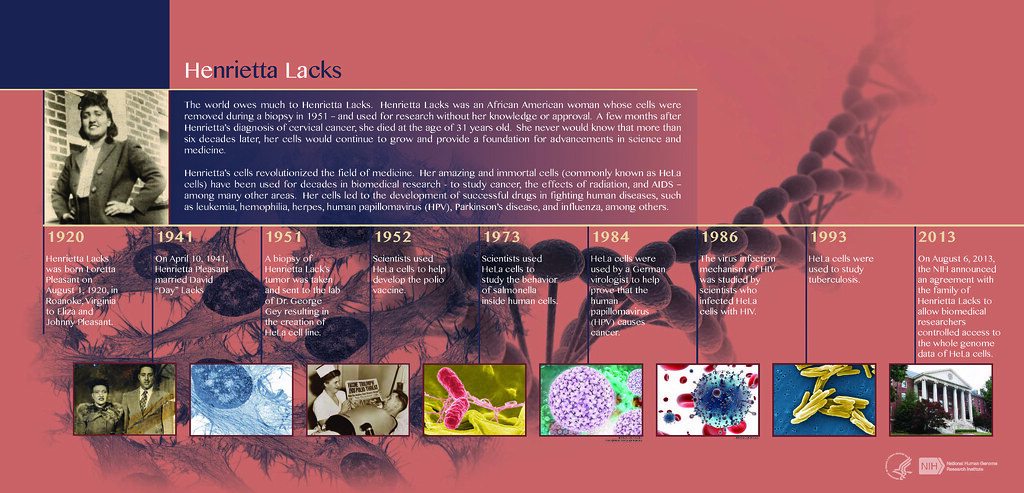Welcome to blog no.1….!
My blogs are both a combination of politics and science – the two worlds combining in, let’s face it, what can sometimes be an unfavourable way. I feel like this is something that should have more of a spotlight and also is involved in a lot of controversy. Henrietta Lacks is regarded as the mother of modern medicine but why? What did she do? This story also reminds me that, like Henrietta, anyone has the potential to have a massive impact on the World, whether they know it or not.
Background
Henrietta Lacks was an incredibly poor tobacco farmer born in the 1920s in Virginia, US. Even when she died of cervical cancer in 1951 she had no idea what a huge impact she would have on the future of science. This is where the controversy begins…
In 1951 Lacks was diagnosed with cervical cancer and underwent radiation. During two of the treatments her doctor took two cell samples from her without her consent and grew them in the lab.
Once Dr. George Otto Gey cultured the cells he noticed that they were different to other cells – they seemed to stay alive for a lot longer than ‘normal’ cells. They were isolated and multiplied and these immortal ‘HeLa’ cells became incredibly important in developing the polio vaccine as well as gene mapping, in vitro fertilisation, cloning and many more uses today.
But what makes these cells so special? The Berkley Science Review states that a normal human cell will divide between 40 and 50 times before dying, which can be an issue with research as for some unknown reason cells from Henrietta Lacks were found to continue dividing indefinitely, the reason for this is thought to involve the type of tumour she had. For this reason these cancerous cells are vital for research due to not only sharing their properties with normal cells but by reproducing rapidly, easily and cheaply. They are now used as the industry standard for cell lines.
Since this cell line began over 10,000 patents involving HeLa cells have been registered.

Polio Vaccine
The polio vaccine was the first major use for the HeLa cells. Before 1955, Jonas Salk was using Rhesus monkey cells to measure antibody production to Poliovirus infection. Unfortunately with Rhesus monkey cells being in-durable and therefore production of large quantities being difficult it was not an ideal situation. Once HeLa cells were discovered they replaced the Rhesus monkey cells and produced staggering results. HeLa cells have gone on to be involved in many major breakthroughs in science and medicine.
Ethics
Since the cells were taken from Henrietta, they will have made the pharmaceutical companies into the hundreds of millions of pounds. This led the family to desire compensation on their mother’s behalf.
The major ethical query is not only that the cells were taken without the knowledge of either Henrietta or her family, it’s also that once the cells had been harvested and cloned they were sold for which the family got no compensation. Do they deserve compensation? I don’t know, in my opinion the cells have saved an unknown number of lives so the international recognition, the honor at the Smithsonian Institution and the National Foundation of Cancer Research along with the fact that Morgan State University granted Lacks a posthumous honorary degree may be enough to settle that. How much money would it be anyway?!
The Lacks family has attempted (and struggled) to gain control of the strain and the decision of the California Supreme Court was that the University did have a right to commercialize the discarded tissue.
Rebecca Skloot, a biologist and author of ‘The Immortal Life of Henrietta Lacks’ has said, “What most people are most shocked at is that Henrietta’s cells were taken without her knowledge, and without her consent. But that’s standard practice, here in the UK as in the US. If you sign a general consent form before surgery, any sample cells removed may be used for research later, and the doctors don’t have to let you know.”
She went on to say, “The general standpoint of medical science is that cells taken from an individual and used for research benefit the common good, so it’s OK to use them. But the Lacks story shows that isn’t true – certainly not in America, anyway. Because Henrietta’s cells were used to develop medical treatments – but those treatments were only available to people who could afford medical insurance, and impoverished families like the Lackses were exactly the sort of family who couldn’t.”
Henrietta had 5 children, all of who are now either dead or have various serious illnesses. One of the sons asked,”If our mother is so important to science, why can’t we get health insurance?” – if this is accepted practice is it something that should continue?
News
This story has been all over the news recently, mainly because of the new HBO film coming out. But will this spotlight mean they finally get the compensation they think they deserve?